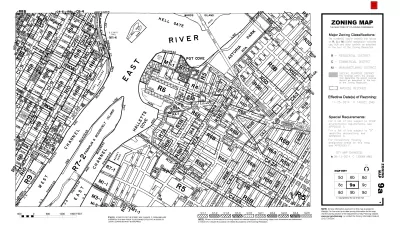If changes to Title 21 of the city’s municipal code are approved, Anchorage could go from having 15 types of residential zoning to one.

The Anchorage Assembly, fresh off ADU reforms and the elimination of parking requirements, are considering changes to the city’s residential zoning code that would consolidate zoning districts and make it easier to build multi-family housing in residential zones.
According to an article by Zachariah Hughes, elected officials have proposed changes to the city’s Title 21, the section of municipal code that governs residential zoning, to better realize the city’s long-term development goals, as expressed in the city’s 2040 Land Use Plan, adopted in 2017.
“[Assemblymember Kevin] Cross pointed out that many of the residential building codes in Title 21 are from a drastically different economic era, when high-paid oil and gas jobs drove development toward large single-family houses on big lots,” reports Hughes. “The latest proposal from Cross and his cosponsors states that demographic projections for Anchorage anticipate more aging households, families with fewer children, ‘diverse households and income levels that need more affordable housing options and more transportation choices,’ more multigenerational families and a less transient workforce.”
Hughes is reporting on the proposed reforms after Cross reduced the scope of the reforms from an original proposition.
“The original version of the measure from Cross and Assembly Vice Chair Meg Zaletel, who represents Midtown, proposed eliminating distinctions among the 15 different residential zoning district criteria in the municipality and replacing the complicated jumble with two broad categories,” according to Hughes. “The new version ‘further simplifies the proposal by creating a single residential zone, effective January 1, 2025,’ the Assembly members said in a statement.”
As also noted by Hughes, the proposal will not change zoning in business districts, the downtown district, or industrial districts in the city.
FULL STORY: Assembly members introduce revised plan to overhaul Anchorage residential zoning amid push for more housing

Trump Administration Could Effectively End Housing Voucher Program
Federal officials are eyeing major cuts to the Section 8 program that helps millions of low-income households pay rent.

Planetizen Federal Action Tracker
A weekly monitor of how Trump’s orders and actions are impacting planners and planning in America.

Ken Jennings Launches Transit Web Series
The Jeopardy champ wants you to ride public transit.

California Invests Additional $5M in Electric School Buses
The state wants to electrify all of its school bus fleets by 2035.

Austin Launches $2M Homelessness Prevention Fund
A new grant program from the city’s Homeless Strategy Office will fund rental assistance and supportive services.

Alabama School Forestry Initiative Brings Trees to Schoolyards
Trees can improve physical and mental health for students and commnity members.
Urban Design for Planners 1: Software Tools
This six-course series explores essential urban design concepts using open source software and equips planners with the tools they need to participate fully in the urban design process.
Planning for Universal Design
Learn the tools for implementing Universal Design in planning regulations.
Ada County Highway District
Clanton & Associates, Inc.
Jessamine County Fiscal Court
Institute for Housing and Urban Development Studies (IHS)
City of Grandview
Harvard GSD Executive Education
Toledo-Lucas County Plan Commissions
Salt Lake City
NYU Wagner Graduate School of Public Service





























